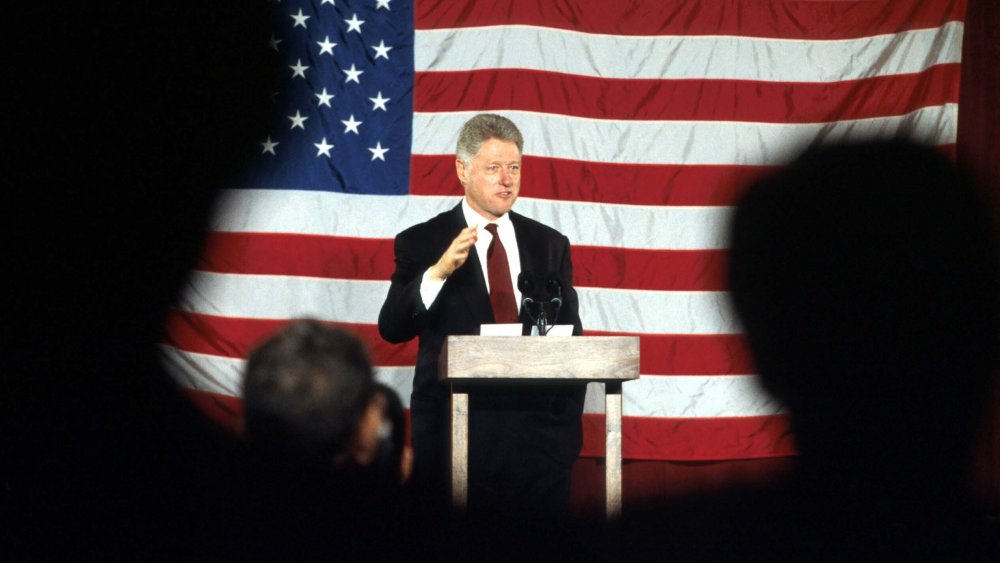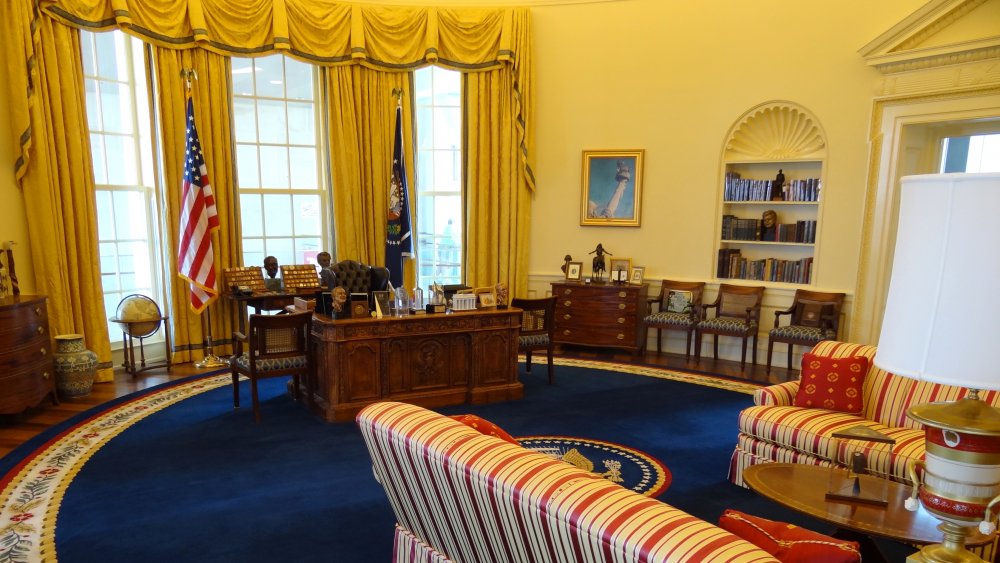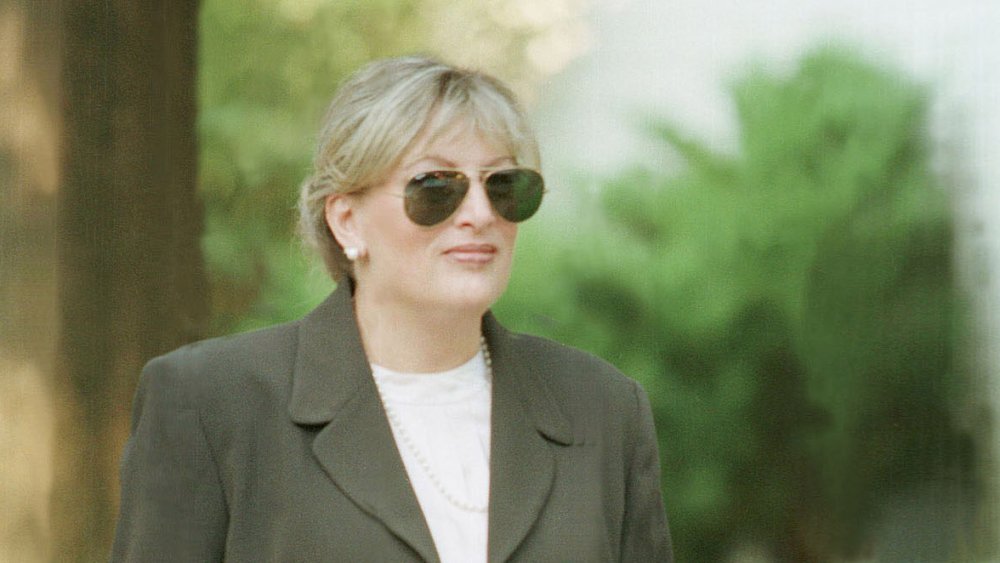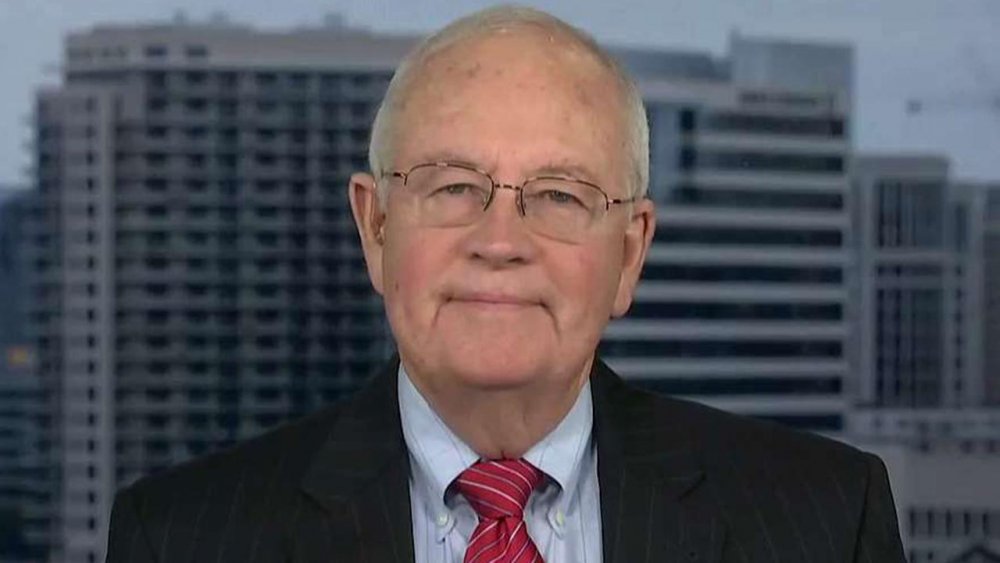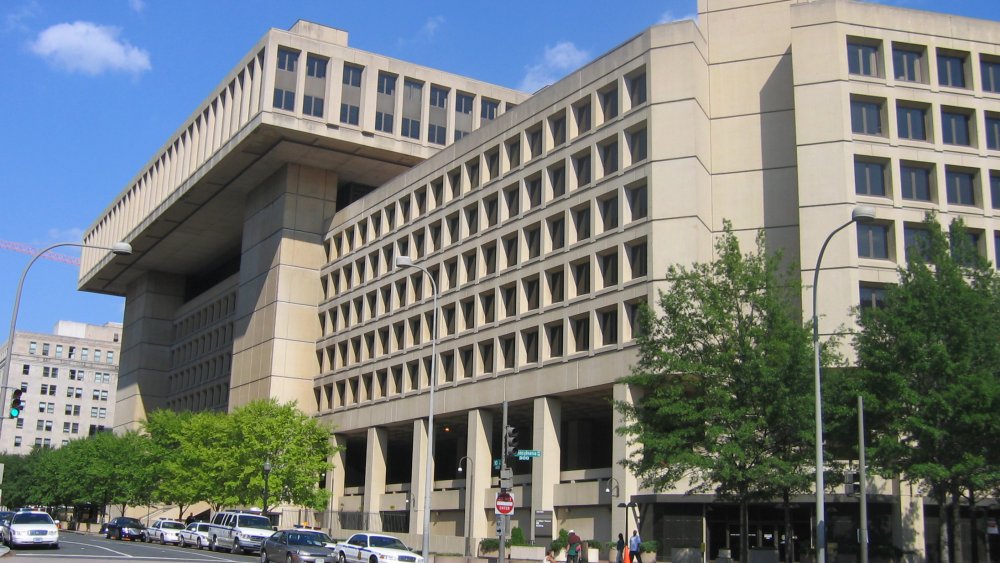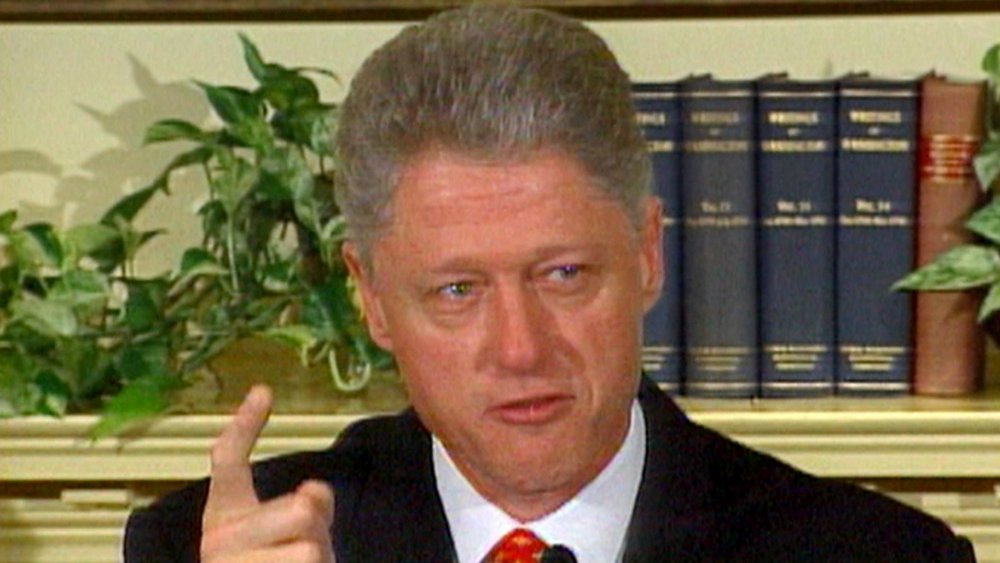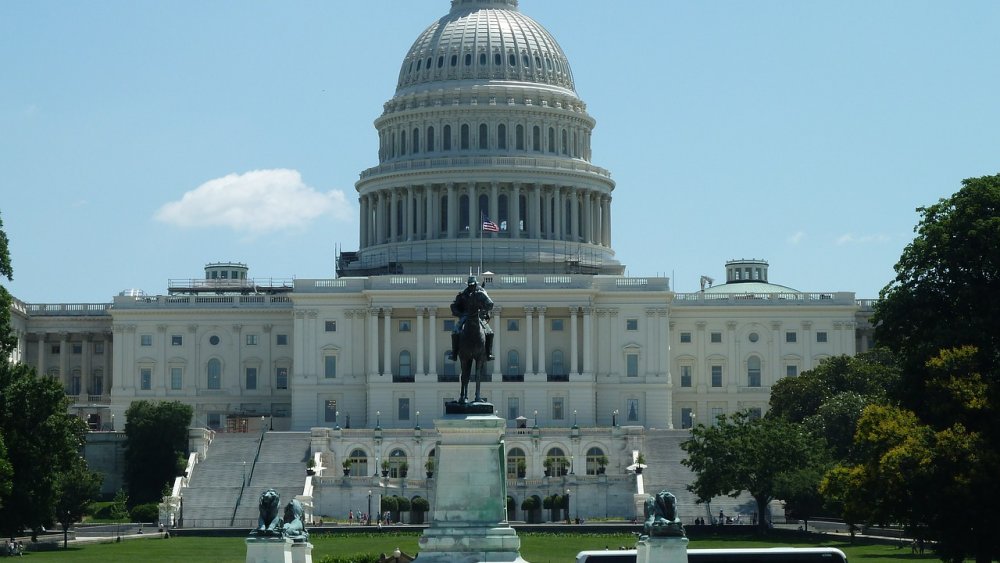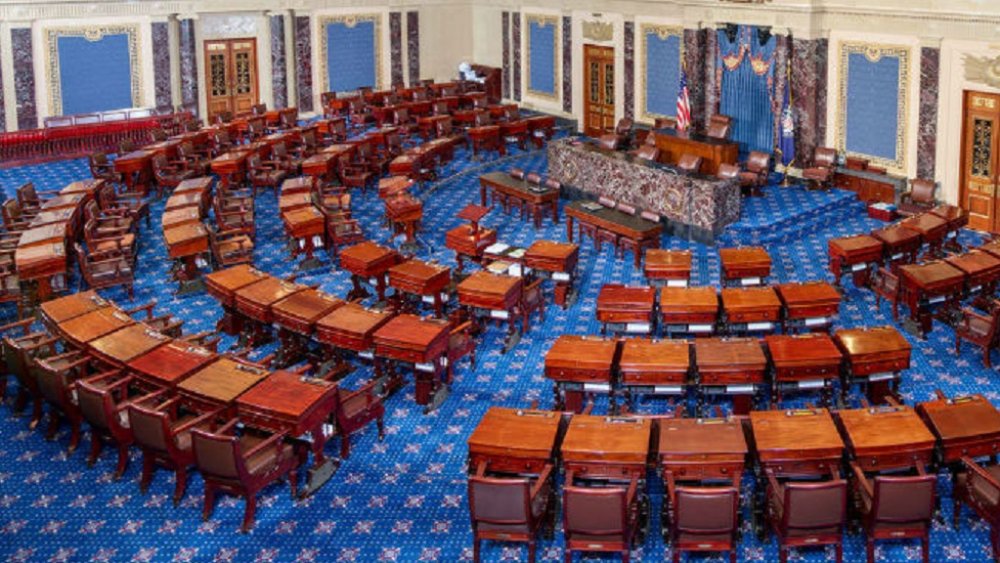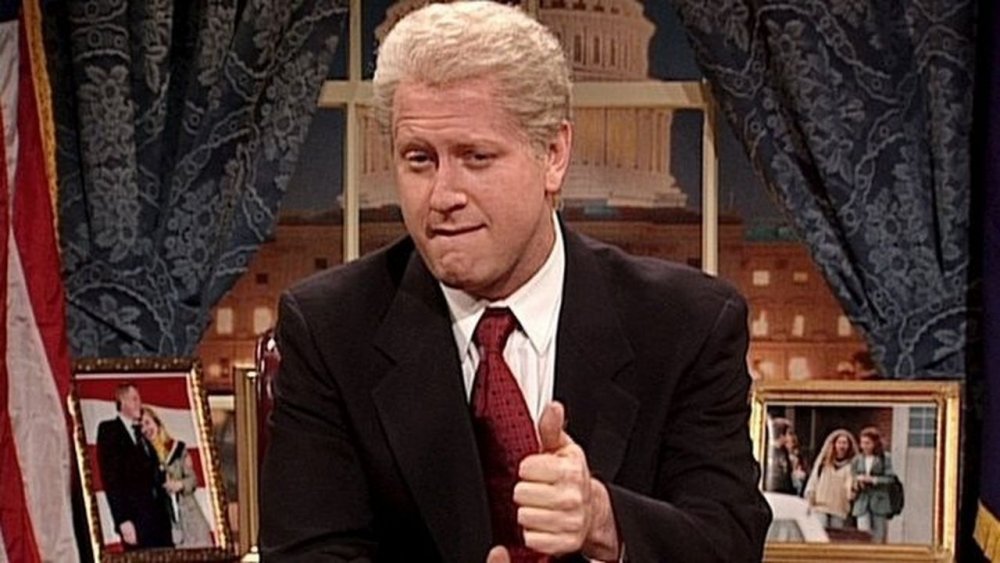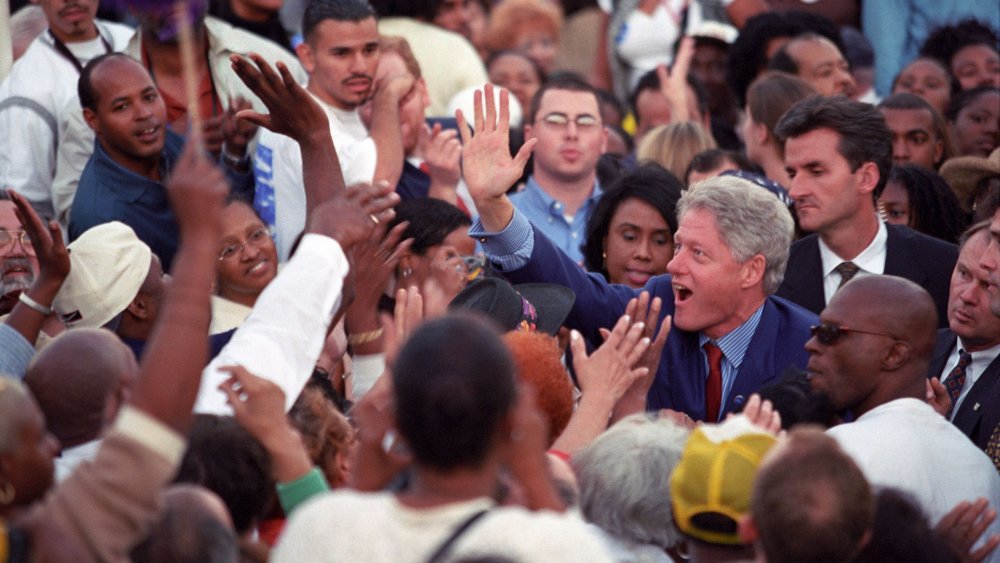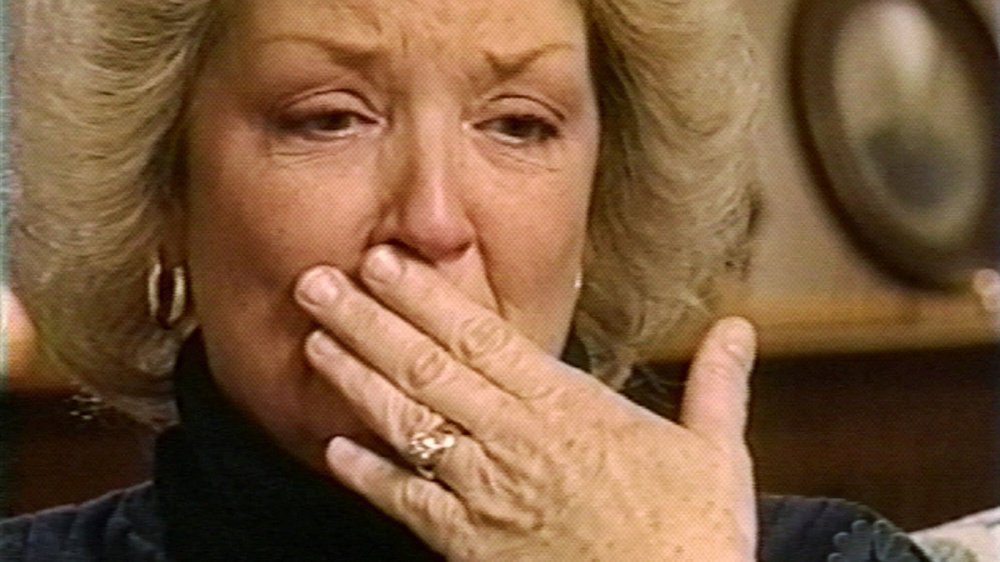The True Story Of The Clinton Impeachment
If you ask a random American why President Bill Clinton was impeached, they'll probably say it was because of a sex scandal. But contrary to popular belief, Clinton was not put on trial before the Senate for doing imaginative things with a cigar in the Oval Office.
In the '90s, the Clinton impeachment was seen as a joke, a very serious judgement on America's obsession with sex, or not that big a deal, depending on your perspective. The fact a majority Republican Senate voted not to convict the Democratic president on either perjury or obstruction of justice seemingly proved that the charges were trumped up.
But if you ask a random American how the impeachment proceedings against Bill Clinton got started, unless they're a political super nerd, they probably couldn't tell you. It starts not with flirting in the White House, but with 230 acres of flooded land in Arkansas. This is the true story of the Clinton impeachment, the messy and the mundane.
The salacious Clinton scandal started out very boring
The Clinton impeachment became one of the most salacious political scandals in American history. But the event — known as Whitewater — that triggered the investigation that turned into the report that led to impeachment was not about sex and lies but land and fraud. In 1978, when Bill Clinton was attorney general of Arkansas, he and Hillary formed the Whitewater Development Corporation with a couple called James and Susan McDougal. All four took out a joint loan of $180,000 to pay for 230 acres of riverfront property, where they planned to build and sell vacation homes. However, the land turned out to be prone to flooding, and the Clintons lost about $40,000, according to the Washington Post.
So far, so legal. Bill was elected Governor of Arkansas months after forming the corporation. James bought a small savings and loan association, and hired Hillary to do some legal work for it. But then James' bank got involved in corruption and ultimately failed, leading to a government bailout of around $73 million.
After James and associates were convicted on various corruption charges, some claimed that the Clintons were involved. This prompted an investigation by an independent special counsel, initially led by Robert Fiske, who was replaced in 1994 by Kenneth Starr, who had previously worked in the administrations of Presidents Ronald Reagan and George H. W. Bush. This counsel later started looking into Bill's relationship with Monica Lewinsky.
Monica Lewinsky and Bill Clinton's affair lasted from 1995 until 1997
In the summer of 1995, 22-year-old Monica Lewinsky reported to the White House for an internship. That November, she was hired to a paid position dealing with correspondence, according to the Washington Post.
The day after accepting the job, she and 49-year-old President Bill Clinton both attended a birthday party in the chief of staff's office. In 2018, Lewinsky told documentary makers that she'd had a crush on the President since she'd first met him in person, but he'd first noticed her the day before the party. That evening marked the first of the "sexual encounters" between the two, which took place on and off until March 29, 1997. Clinton and Lewinsky would arrange to meet up by phone, often under the pretext of White House business, often in and around the Oval Office. They also exchanged small gifts.
This didn't go unnoticed in the White House, and in April 1996, higher-ups transferred Lewinsky to the Pentagon in an effort to get her away from the president. Clinton promised to move her back after the 1996 presidential election, but instead he ended the affair once and for all in May 1997, a few months after their last "encounter." The two continued to contact each other, but mainly to discuss Clinton's failure to deliver on his promise of another White House position, and, as Clinton's sexual harassment lawsuit heated up, to find a way to keep their liaison secret.
Bill Clinton was accused of sexual harassment by Paula Jones
Most people interested in Clinton's impeachment have heard of Monica Lewinsky — but you may not know about Paula Jones. It was Jones who inadvertently sparked the investigation into Clinton's relationship with Lewinsky, and his subsequent impeachment. In 1994, Jones told a right-wing news outlet that three years earlier, when Clinton was governor of Arkansas and she was a low-level state employee, he had her brought to his hotel room where he exposed himself and propositioned her. Days later, Jones filed a sexual harassment lawsuit against the now-president. She also claimed that he had defamed her by publicly denying her accounts.
Jones was maligned as gold-digging trailer trash by Democrats, and celebrated as a whistleblower by Republicans, according to the New York Times. Clinton tried to have the case dismissed on the grounds of presidential immunity, arguing that it would distract him from his duties. But after various appeals, in 1997, the Supreme Court ultimately ruled that the trial could go ahead. (This decision contributed to the Supreme Court's 2020 ruling that Donald Trump was not immune from prosecution over his tax returns while president.)
This is where Kenneth Starr re-enters the story. Starr and his special counsel had expanded the scope of the Whitewater investigation to look into Clinton's other potential wrongdoings. (See: Travelgate.) And in January 1998, Starr received permission to look into the Jones case, after receiving some very damning evidence from an unlikely source.
Monica Lewinsky was betrayed by a friend
Monica Lewinsky and Bill Clinton's affair might have stayed secret if it hadn't been for Lewinsky's unfortunate choice of confidante. When Lewinsky was moved to the Pentagon in April 1996, she became friends with Linda Tripp, a career civil servant who idolized George H.W. Bush and thought Bill Clinton was immoral, according to the Washington Post. CNN reported that it was Tripp who told Paula Jones' lawyers about Kathleen Willey's accusation that Clinton had propositioned her in the Oval Office: Tripp was quoted in a Newsweek piece about the incident in July 1997.
Tripp had planned to write a book about Clinton's White House before she met Lewinsky, but didn't have enough material. Once the other woman started opening up about her relationship with the president, Tripp realized she had a surefire bestseller. At the urging of conservative publisher Lucianne Goldberg, from October 3, 1997, Tripp started to record her calls with Lewinsky. After telling a Newsweek reporter about the tapes, Tripp went to Paula Jones' lawyers. On November 24, 1997, they subpoenaed her, and nearly two weeks later, Lewinsky was named as a potential witness.
Tripp, who died in April 2020, always portrayed her motivation as protecting women. Lewinsky would later tell a grand jury, "I really hate Linda Tripp."
Linda Tripp's tapes gave Kenneth Starr a reason to expand his investigation
Once Lewinsky and Clinton learned that her name was on the witness list in the Jones case, it appears that they tried to come up with a story that denied allegations of an affair. At the same time, Lewinsky was pressuring Clinton to help her find another job.
On December 19, 1997, Lewinsky was subpoenaed by Jones' lawyers. Clinton asked his adviser Vernon E. Jordan Jr. to help Lewinsky with the affidavit she signed on January 7, 1998. In it, she declared that she had "never had a sexual relationship with the president." According to the Washington Post, Clinton had previously lied to Jordan that he and Lewinsky had not had an affair.
Things got worse for Lewinsky, Clinton, and co. The Jones lawsuit was a civil suit, but on January 12, Tripp gave her taped conversations with Lewinsky to Kenneth Starr's independent counsel. Three days later, Starr requested permission to expand the scope of his inquiry into the Clinton presidency to include investigations into the affair with Lewinsky (which was granted the next day.) Meanwhile, the Washington Post reported that elsewhere on January 15, Lewinsky told Tripp not to reveal the details of her relationship with Clinton, and that she wasn't worried about getting in trouble for lying in her affidavit because Clinton was prepared to tell the same story.
The FBI convinced Lewinsky to testify against Clinton
On January 16, 1998, Monica Lewinsky went to the Ritz-Carlton hotel near the Pentagon to meet Linda Tripp for lunch. But as the New York Times reported eight days later, she was instead surrounded by FBI agents, who escorted her to a room and told her that they had 20 hours of her talking about her relationship with Clinton. This contradicted the affidavit she'd signed in the Paula Jones case, which meant she could potentially be charged with perjury.
Over the next nine hours, the FBI and Starr's prosecutors tried to convince Lewinsky to work with them, including gathering evidence on other White House employees. Lewinsky said that she wasn't allowed access to a lawyer as they told her she could be charged with crimes including perjury, obstruction of justice, and conspiracy. She also said that they threatened to charge her mother, Marcia Lewis. Speaking about that day in 2018, Lewinsky told documentary makers that one prosecutor told her she could face 27 years in prison, and that she contemplated suicide.
Eventually, Lewinsky was allowed to call Lewis, who traveled to Washington, D.C. from New York. They called a lawyer in Los Angeles, and tried to come to an agreement over immunity. For over two weeks from July 27, she testified to Starr's team and a grand jury about the affair, and on July 28, she was granted immunity in exchange for her testimony and providing evidence.
Bill Clinton denied having sexual relations with Lewinsky while under oath
While Lewinsky was being held by the FBI and Starr's prosecutors, the blissfully unaware Clinton was talking his way into what would become grounds for his impeachment. On January 17, 1998, Clinton was deposed by Jones' lawyers. In an interview published in the Atlantic in 2018, Clinton's lawyer Robert Bennett said that Jones' team, "had this very involved definition of sexual relations, which the president took full advantage of." Bennett said that Lewinsky's affidavit stated, "there is absolutely no sex of any kind in any manner, shape or form, with President Clinton," and that Clinton testified that this was "absolutely true." According to the Washington Post, he also said that he couldn't remember if he'd ever been alone with Lewinsky.
That night, conservative news site the Drudge Report broke the story of the affair, and mainstream media picked it up a few days later. On January 26, Clinton infamously told reporters, "I did not have sexual relations with that woman, Miss Lewinsky."
Starr accused Clinton of lying to Jones' lawyers and of obstruction of justice, and subpoenaed him to appear before a grand jury. On August 18, Clinton became the first sitting president to testify before a grand jury that was investigating his conduct. He admitted to "inappropriate intimate contact" but denied lying in his deposition. That night, he addressed the nation in a four-minute televised speech, which was criticized for coming across as unapologetic and remorseless.
Kenneth Starr's report convinced the House of Representatives to impeach Clinton
On September 9, 1998, Starr turned his report over to Congress. He and his team also sent over 36 boxes of evidence, which were locked in a room at the Capitol where members of Congress could study them. Republican Representative Bill McCollum later told the Atlantic, "We couldn't get Democrats to go read it ... I don't think they wanted to."
Stephen Bates, one of the prosecutors who worked on the report, told the Atlantic in 2018 that none of them thought it would be released to the public. He said that they'd based this on the Jaworski report, which looked into Nixon's wrongdoings: but one of the secrets no one ever told you about the Watergate scandal is that the report was never made public. However, two days after Congress saw the Starr report, the House of Representatives voted 363–63 to release it to the public. The report was criticized by some for its graphic sexual content, which Democrats argued was included purely to humiliate the President. Democrats also argued that the investigation was politically motivated and legally sloppy, and that Starr's team had been leaking information from the grand jury trials.
The Starr report identified 11 potential reasons for impeachment. And on December 19, 1998, the House of Representatives voted to approve two articles: perjury and obstruction of justice.
The Senate voted not to convict Clinton
What would come next was uncertain. What actually happens when a president is impeached depends on Congress, and this was only the second impeachment in history. According to the LA Times, Republican and Democratic Senate leaders spent the holidays trying to work out a process. The Senate was made up of 55 Republicans and 45 Democrats. The trial officially started on January 7, 1999, presided over by Chief Justice William H. Rehnquist. It was agreed that the House managers and Clinton's lawyers would each have 24 hours to make their case (divided over several days) followed by 16 hours of questioning for each side from the Senate, which would then vote on whether to call witnesses. The day Clinton's lawyers began their three-day opening statement, he delivered the State of the Union address.
On January 24, Lewinsky was interviewed for two hours by House managers, who called her "very impressive." She was later deposed, as were Clinton's adviser Vernon E. Jordan Jr. and White House communications aide Sidney Blumenthal, but the Senate voted against having Lewinsky testify in person, instead using video of her deposition interview.
The Senate wrapped up arguments on February 8 and began deliberating in private the next day. It needed 67 votes for each charge to convict. On February 12, 1998, Clinton was found not guilty on both articles, with all Democrats voting not guilty on both, 10 Republicans voting not guilty on perjury, and 5 voting not guilty on obstruction of justice.
The public was obsessed with Clinton's sexy impeachment scandal
The public snoozed through the Clintons' dreary and complicated Whitewater and Travelgate scandals — but the news that the president had been engaged in sexual activity with a younger woman in the Oval Office caught everyone's attention. Clinton, Lewinsky, and Tripp were satirized on Saturday Night Live: John Goodman played the latter. According to Vanity Fair, millions of people took advantage of the then-novel internet to download the Starr report, not because they suddenly had an interest in constitutional justice but because of the dirty details.
Despite the national attention the scandal brought, public opinion of Clinton appeared to stay relatively stable. According to the Wall Street Journal, Gallup data showed that Clinton's approval rating never fell below 60 percent throughout impeachment, and it actually went up to 73 percent the day after the House voted to impeach him. By the time he was acquitted, it was back at 65 percent.
However, the scandal may have damaged the Democrats in the long term. Clinton's second term ended in 2000, and some political commentators have argued that although the public still believed he was a competent president, they no longer trusted him personally, and may have held this against Democratic presidential candidate Al Gore. As the New York Times points out, Gore's opponent George W. Bush promised to restore dignity to the White House, and in January 2001, the Republicans controlled the White House, the House, and the Senate.
Bill Clinton thrived after impeachment
Over two decades after his impeachment, Bill Clinton has been all but forgiven, at least by Democrats. The subject comes up occasionally, for example when Donald Trump was impeached for abuse of power and obstruction of Congress in December 2019. But after serving out the rest of his presidency, Clinton started a lucrative career as a speaker, earning as much as $750,000 a speech, according to the LA Times. Hillary Clinton claimed that the high fees were necessary to pay off legal costs partly accrued during his impeachment.
Kenneth Starr went on to defend Jeffrey Epstein over charges of sexual misconduct in the mid-00s. In 2010, Starr was made president of Baylor University, but was fired in 2016 for failing to investigate a culture of sexual assault on the campus. In 2020, he left his job as a Fox News contributor to join Trump's legal defense team during his impeachment.
Predictably, Monica Lewinsky was the most hurt by the scandal. At the time, she was portrayed in the press and perceived by the public as a bimbo and a slut. After the #MeToo Movement empowered more women to speak out about sexual abuse, she wrote an article for Vanity Fair in which she said that she'd recently been diagnosed with post-traumatic stress disorder (PTSD) caused by being ostracized, and acknowledged that she now realizes Clinton's behavior constituted an abuse of power. She's become an anti-bullying advocate and writer.
Bill Clinton has been accused of sexual abuse by other women
On November 14, 1998, Jones and Clinton reached an out of court settlement in which he agreed to pay Jones $850,000, but with no apology or admission of wrongdoing, the Washington Post reported. But Jones, Lewinsky, and Willey weren't the only women who accused Bill Clinton of inappropriate sexual conduct.
During the course of Jones' case, her legal team filed 700 pages of documents pertaining to Clinton's alleged pursuits and assaults of multiple women, some of whom remained anonymous. Weeks after Clinton was acquitted, in February 1999, one woman, Juanita Broaddrick, went public. In an episode of Dateline NBC, she accused Clinton of raping her in 1978 in a Little Rock, AK, hotel room when she was a volunteer for his gubernatorial campaign. Starr knew of these accusations: they were mentioned in a footnote in his report. But he decided the rape was outside his by then extensive scope. Broaddrick's claims have largely been forgotten, even though multiple outlets have since deemed them credible.
